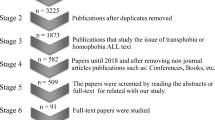Abstract
This study focuses on work alienation and publication productivity of agricultural scientists in two international research centers. Previous research has been criticized because the variables emphasized have typically been poorly correlated with publication productivity. Additionally, although work alienation of professionals has received considerable attention in the literature, seldom has it been included in empirical studies of publication productivity. Results indicate two perceptions of structure, centralization and formalization, are significantly correlated with work alienation, but less so with publication productivity. Work alienation is significantly, but modestly, correlated with publication productivity. In a multiple regression analysis, work alienation proved to be less important than perceived centralization. Implications for supervisors of scientific staffs include reducing the layers of hierarchy and empowering staff by giving them a voice in research goals and organizational operations.
Similar content being viewed by others
References and notes
C. Perrow,Complex Organizations, Random House, New York, 1986.
M. F. Fox, Publication productivity among scientists: A critical review,Social Studies of Science, 13 (1983) No. 2, 285–305.
M. Aiken, J. Hage, Organizational alienation: A comparative analysis,American Sociological Review, 31 (1966) No. 4, 497–507.
E. C. Ladd, S. M. Lipset, How professors spend their time,Chronicle of Higher Education, 14 (1975) 2.
G. A. Cole, Classifying research units by patterns of performance and influence, In:F. M. Andrews (Ed.),Scientific Productivity, Unesco, Paris, 1979, p. 353–404.
L. Busch, W. B. Lacy,Science, Agriculture and the Politics of Research, Westview, Boulder (CO), 1983.
F. M. Andrews, The international study: Its data sources and measurement procedures, In:F. M. Andrews (Ed.),Scientific Productivity, Unesco, Paris, 1979, p. 17–50.
J. Gaston,The Reward System in British and American Science, John Wiley and Sons, New York, 1978.
J. S. Long, R. McGinnis, Organizational context and scientific productivity,American Sociological Review, 46 (1981) No. 4, 422–442.
E. Hammel,Report on the Task Force on Faculty Renewal, University of California, Berkeley, 1980.
R. Over, Does scholarly productivity impact decline with age?,Scientometrics, 13 (1988) 215–223.
D. C. Pelz, F. M. Andrews,Scientists in Organizations: Productive Climates for Research and Development, University of Michigan, Ann Arbor, 1976.
L. Busch, W. B. Lacy,op. cit.,, p. 66.
H. A. Shepard, Basic research and the social system of pure science,Philosophy of Science, 23 (1956) No. 3, 48–57.
M. R. Halperin, A. K. Chakrabarti, Firm and industry characteristics influecing publications of scientists in large American firms,R & D Management, 17 (1987) No. 3, 167–173.
M. Bartell, A bibliographical introduction and review of some factors influencing the effectiveness of research and development teams: The agricultural research context,Agricultural Administration, 16 (1984) No. 3, 113–129.
M. J. Mulkay, Sociology of scientific community, In:Spiegel-Rosing, D. Price (Eds)Science, Technology and Society, Sage, London, 1977, p. 103.
D. B. Miller,Managing Professionals in Research and Development, Jossey-Bass, San Francisco (CA), 1986;R. K. Kain, H. C. Triandris,Management of Research and Development Organizations: Managing the Unmanageable, John Wiley and Sons, New York, 1990.
H. Braverman, Work and unemployment,Monthly Review, 27 (1975) No. 1, p. 20.
J. Israel,Alienation From Marx to Modern Sociology, Allyn and Bacon, Boston (MA), 1971, 53–55;I. M. Zeitlin,Ideology and the Development of Sociological Theory, Prentice-Hall, Englewood Cliffs (NJ), 1981.
P. D. Montagna,Occupation and Society, John Wiley and Sons, New York, 1977.
R. Hodson, T. A. Sullivan,The Social Organization of Work, Wadsworth, Belmont (CA), 1990, p. 97–98.
R. J. Havinghurst, Youth in exploration and man emergent, In:H. Borow (Ed.),Man in a World of Work, Houghton, Mifflin, Boston (MA), 1964, p. 228.
P. D. Montagna,op. cit.,, p. 231.
R. H. Hall,Organizations: Structure and Process, Prentice-Hall, Englewood Cliffs (NJ), 1991;M. Zey-Ferrell,Dimensions of Organizations: Environment, Context, Structure, Process and Performance, Goodyear Publishing, Santa Monica (CA), 1979.
R. Hodson, T. A. Sullivan,op. cit.,, pp. 275–277.
Ibid,, pp. 274–277.
D. Organ, C. Green, The effects of formalization on professional involvement: A compensatory process approach,Administrative Science Quarterly, 26 (1981) No. 2, 237–257.
P. M. Podsakoff, L. J. Williams, W. D. Todor, Effects of organization formalization on alienation among professionals and nonprofessionals,Academy of Managements Journal, 29 (1986) No. 4, 820–831.
S. P. Robbins,Organizational Theory, Prentice-Hall, Englewood Cliffs (NJ), 1987.
K. I. Miller, P. R. Monge, Participation, satisfaction, and productivity: A meta-analytic review,Academy of Management Journal, 29 (1986) No. 2, 727–753.
R. Blauner,Alienation and Freedom, University of Chicago, Chicago (IL), 1964.
S. Becker, D. Neuhauser,The Efficient Organization, Elsevier, New York, 1975, p. 88.
W. W. Rambo,Work and Organizational Behavior, Holt, Rinehart and Winston, New York, 1982, p. 445.
W. R. Scott,Organizations, Prentice-Hall, Englewood Cliffs (NJ), 1988.
R. Hodson, T. A. Sullivan,op. cit.,, p. 100.
Ibid,, pp. 109–112.
Ibid,, p. 112.
S. P. Robbins,op. cit.,, p. 67.
A. G. Bedian, R. F. Zammuto,Organizations Theory and Design, The Dryden Press, Chicago (IL), 1991, p. 140–142.
S. A. Kirkpatrick, E. A. Locke, The development of measurement of faculty scholarship,Group and Organization Management, 17 (1992) No. 1, 5–23.
D. C. Pelz, F. M. Andrews,op. cit., pp. 273–274.
C. L. Mulford, F. O. Lorenz, B. Wells, P. J. Caldie, A Reexamination of the Aiken and Hage Scales, Paper presented at the Midwest Sociological Society Meeting, Chicago (IL), 1984.
R. Dewar, J. Werbel, Universalistic and contingency predictions of employee satisfaction and conflict,Administrative Science Quarterly, 25 (1979) No. 3, 120–128.
G. Zeitz, Bureaucratic role characteristics and member affective response in organizations,The Sociological Quarterly, 25 (1984) No. 3, 305.
Ibid,, pp. 301–318.
T. J. Peters, R. H. Waterman,In Search of Excellence, Harper and Row, New York, 1982.
Author information
Authors and Affiliations
Rights and permissions
About this article
Cite this article
Mulford, C.L., Waldner-Haugrud, L. & Gajbhiye, H. Variables associated with agricultural scientists' work alienation and publication productivity. Scientometrics 27, 261–282 (1993). https://doi.org/10.1007/BF02016942
Received:
Issue Date:
DOI: https://doi.org/10.1007/BF02016942




